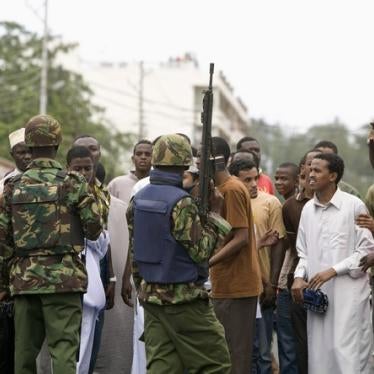(Nairobi) – Kenya’s efforts to tackle insecurity have been marred by serious human rights violations, including extrajudicial killings, arbitrary detentions, and torture by security forces, Human Rights Watch said today in its World Report 2015. The Kenyan government’s failure to ensure accountability for security force abuses and other serious rights violations undermines the rule of law and public confidence.
“Kenyan authorities need to find lawful ways to address the country’s growing security problems,” said Leslie Lefkow, deputy Africa director. “Instead, from Mandera to Mombasa, Kenyan forces use tactics that have resulted in abuses of thousands of people.”
In the 656-page world report, its 25th edition, Human Rights Watch reviews human rights practices in more than 90 countries. In his introductory essay, Executive Director Kenneth Roth urges governments to recognize that human rights offer an effective moral guide in turbulent times, and that violating rights can spark or aggravate serious security challenges. The short-term gains of undermining core values of freedom and non-discrimination are rarely worth the long-term price.
Justice for the 2007-2008 post-election violence remains a challenge. President Uhuru Kenyatta, his deputy William Ruto, and the former radio journalist Joshua arap Sang are facing charges of crimes against humanity at the International Criminal Court (ICC) for their alleged roles after efforts to establish a domestic tribunal failed. While Ruto and Sang’s trial began in September 2013 and is continuing, the ICC prosecutor withdrew charges against Kenyatta in early December 2014, following extensive litigation before the court. The ICC prosecutor cited witness withdrawals and a lack of cooperation from the Kenyan government as factors in her inability to take the case forward to trial.
Kenya experienced a rise in attacks in different parts of the country in 2014, particularly along the coast, where attacks by Somali Islamist insurgent group Al-Shabaab killed 87 in June, and in the northeast, where two back-to-back incidents in Mandera in November and December resulted in 64 dead.
In Nairobi, authorities carried out operation Usalama Watch in April, following a series of grenade and gun attacks in Nairobi’s Eastleigh neighborhood and in Mombasa. Kenyan police and military deployed about 5,000 security officers to Eastleigh over several weeks. The forces raided homes, buildings, and shops, extorted massive sums, and harassed and detained an estimated 4,000 people – including journalists, registered refugees, Kenyan citizens, and international aid workers – without charge, and in appalling conditions for periods well beyond the 24-hour legal limit.
The Anti-Terrorism Police Unit (ATPU) has been responsible for extrajudicial executions, disappearances, and ill-treatment of detainees since 2007. Kenyan authorities have failed to investigate or prosecute the unit’s abuses. Nor has it investigated other violence, such as the gang attacks that killed 10 people and injured 87 in Bungoma and Busia counties during and after the 2013 elections.
Although the Independent Police Oversight Authority (IPOA), a civilian oversight authority, issued a report about the Usalama Watch operation describing 29 complaints against police, none of the officers involved were disciplined.
In a worrying trend, Kenyan nongovernmental groups came under increased pressure for advocating justice for the victims of 2007-2008 post-election violence and police extrajudicial killings. In March 2014, police disrupted a meeting at a hotel in Nakuru, Rift Valley, arrested and briefly detained leaders of the groups meeting there, confiscated materials, and questioned participants on whether the meeting was about the ICC.
Rather than respond to criticisms of the security forces, Kenyan lawmakers passed legislation that further empower security forces and strengthen legislative controls over media, civil society, and other sources of independent criticism.







